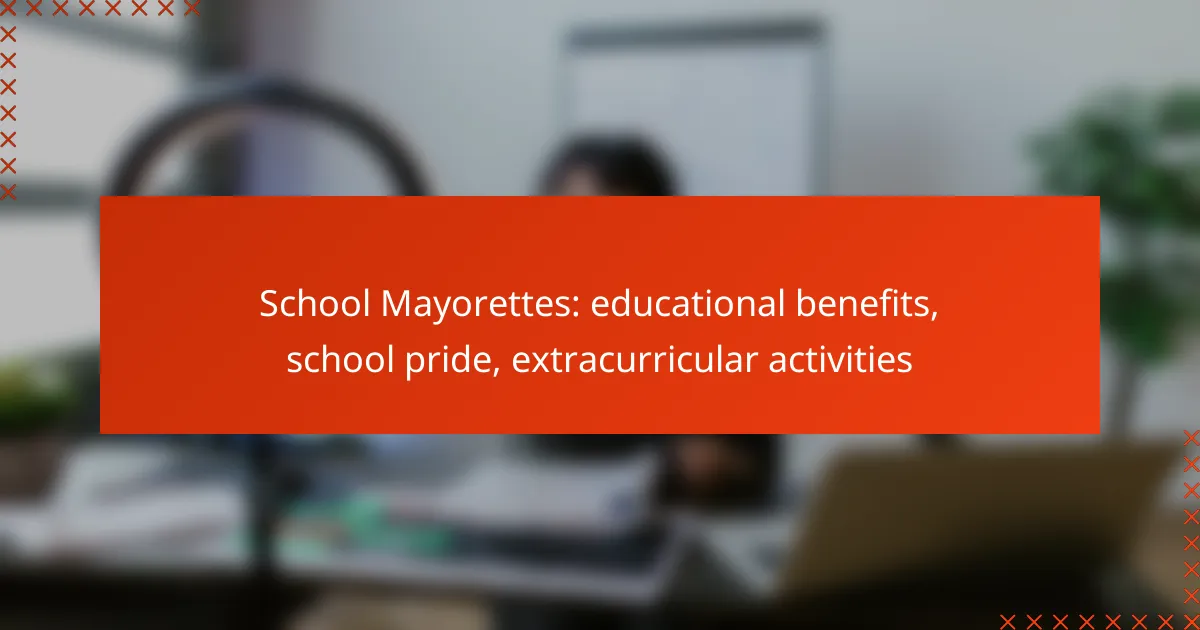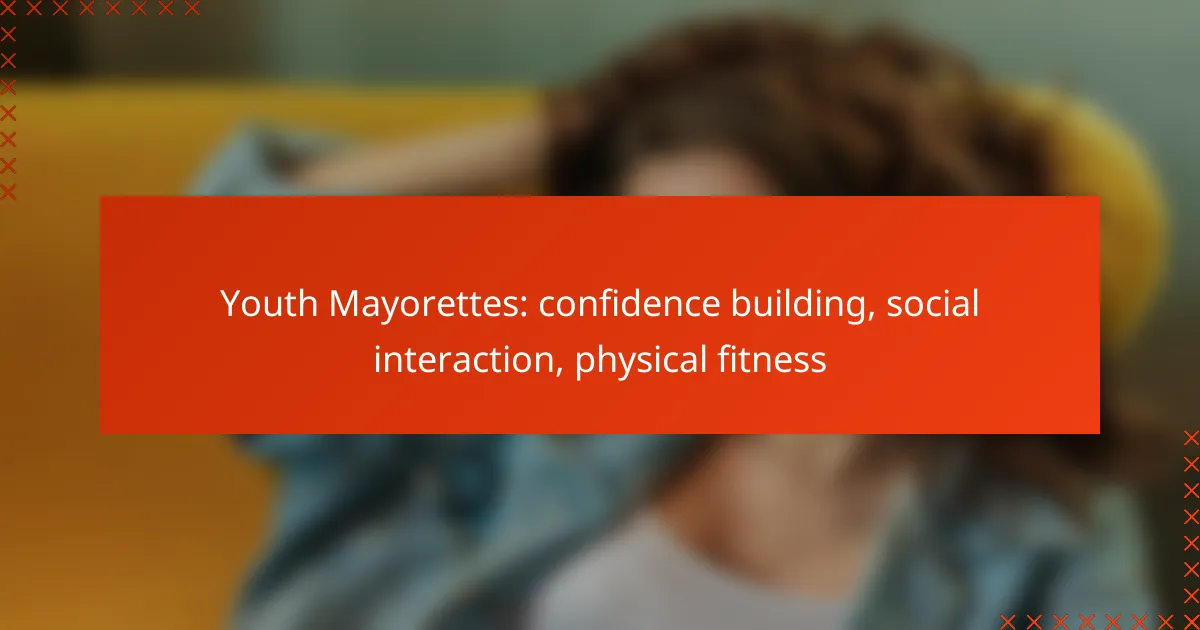School mayorettes in Canada offer valuable educational benefits by developing essential skills and fostering a strong sense of school pride. Through participation in extracurricular activities, they not only enhance their own academic performance but also contribute to a vibrant school community, promoting unity and enthusiasm among students.
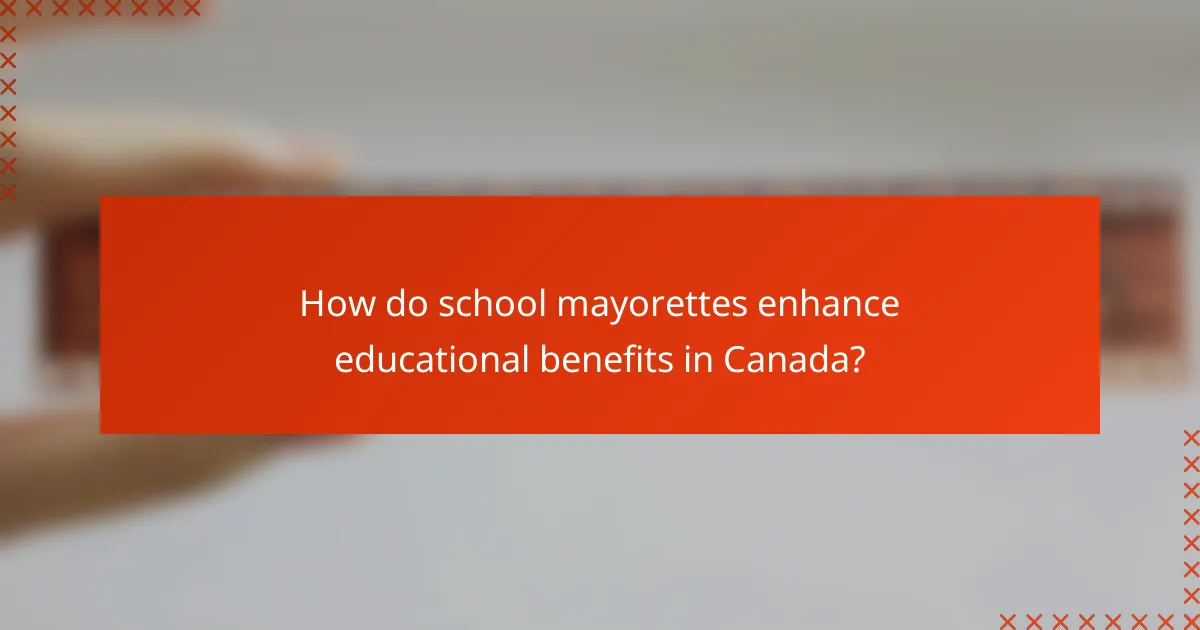
How do school mayorettes enhance educational benefits in Canada?
School mayorettes in Canada provide numerous educational benefits by fostering essential skills and promoting school pride. These programs encourage student involvement in extracurricular activities, which can lead to improved academic performance and personal growth.
Improved leadership skills
Participating as a mayorette helps students develop strong leadership skills. They often take on responsibilities such as organizing events, leading teams, and representing their school, which cultivates confidence and decision-making abilities.
Students learn to communicate effectively and motivate their peers, which are vital skills in both academic and future professional settings. Engaging in leadership roles can also enhance their resumes and college applications.
Increased academic engagement
School mayorettes can lead to increased academic engagement among students. By participating in organized activities, students often feel more connected to their school community, which can translate into a greater interest in their studies.
Research suggests that students involved in extracurricular activities tend to have higher attendance rates and improved grades. This engagement fosters a sense of responsibility and encourages students to maintain their academic performance to participate in mayorette activities.
Enhanced teamwork abilities
Being part of a mayorette team enhances students’ teamwork abilities. Working together on projects and events requires collaboration, communication, and compromise, which are essential for success in both school and later life.
Students learn to appreciate diverse perspectives and develop conflict-resolution skills. These experiences not only strengthen their social skills but also prepare them for future group dynamics in higher education and the workplace.
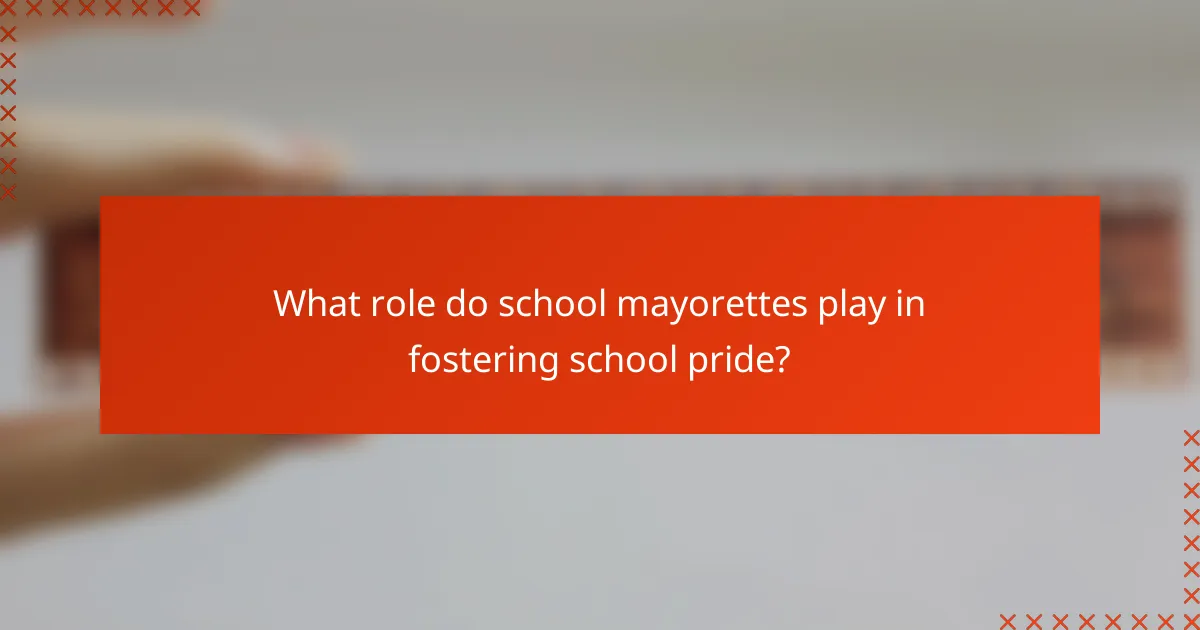
What role do school mayorettes play in fostering school pride?
School mayorettes play a significant role in fostering school pride by representing their institutions at events and engaging in activities that promote unity and enthusiasm among students. Their visibility and participation help to create a sense of belonging and loyalty to the school community.
Promotion of school spirit
School mayorettes actively promote school spirit through participation in various events such as parades, sports games, and community gatherings. By showcasing school colors and symbols, they help to instill a sense of pride and identity among students and faculty alike.
Additionally, mayorettes often lead cheers and chants, encouraging attendance and participation from the student body. This active engagement can significantly boost morale and create a vibrant atmosphere within the school.
Creation of a supportive community
Mayorettes contribute to the creation of a supportive community by fostering friendships and collaboration among students. Through their roles, they often organize team-building activities and social events that bring students together, enhancing camaraderie and mutual support.
Furthermore, mayorettes serve as role models, demonstrating leadership and responsibility. This encourages other students to participate in extracurricular activities, thereby strengthening the overall school community and promoting a culture of inclusivity and support.
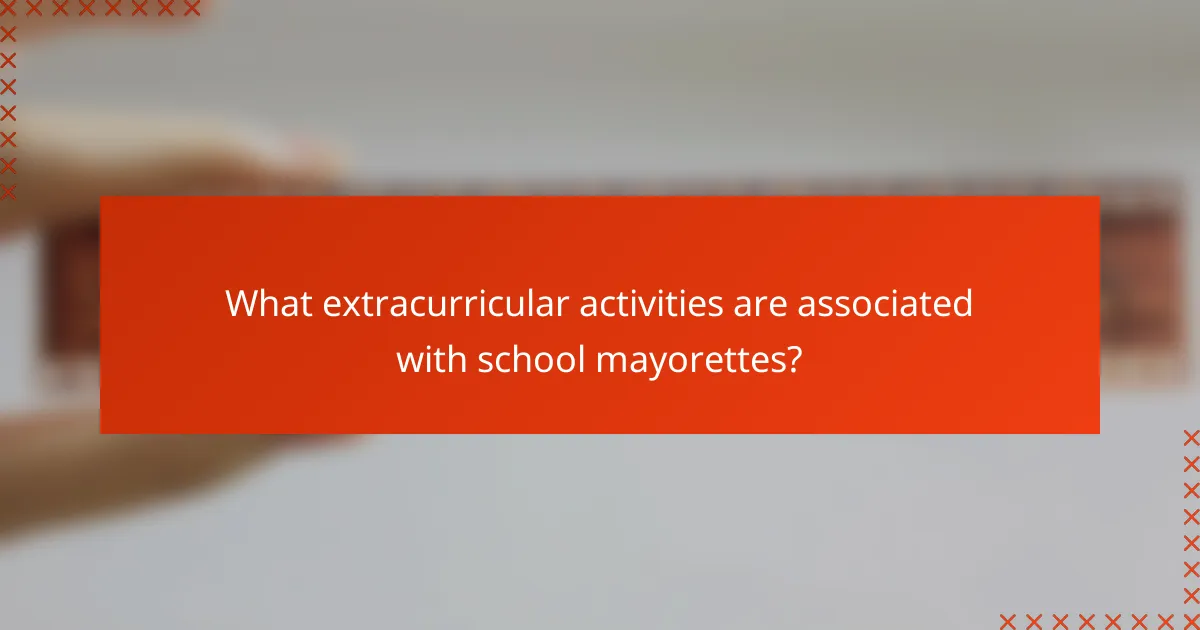
What extracurricular activities are associated with school mayorettes?
School mayorettes participate in various extracurricular activities that enhance their educational experience and foster school spirit. These activities often include performances in parades, community events, and collaborations with local organizations.
Participation in parades and events
Mayorettes typically take part in local parades and school events, showcasing their skills through choreographed routines and synchronized movements. These performances not only promote school pride but also provide students with opportunities to develop teamwork and leadership skills.
Engaging in parades can involve preparation that lasts several weeks, including practice sessions and costume fittings. Schools may also coordinate with local authorities to ensure safety and compliance with regulations during these public displays.
Collaboration with local organizations
School mayorettes often collaborate with local organizations, such as community centers and charities, to participate in events that benefit the wider community. This collaboration can enhance students’ understanding of civic responsibility and the importance of giving back.
Such partnerships may include fundraising activities, workshops, and joint performances, allowing mayorettes to connect with their community while gaining valuable experience in event planning and execution. Schools should seek out organizations that align with their values to create meaningful partnerships.

How can schools implement a mayorette program?
Schools can implement a mayorette program by defining clear goals and involving students in the selection process. This approach fosters engagement and ensures that the program aligns with the values and interests of the student body.
Establish clear objectives
Setting clear objectives is crucial for a successful mayorette program. Schools should identify the specific skills and values they want to promote, such as leadership, teamwork, and school spirit. These objectives will guide the program’s structure and activities.
For example, a school might aim to enhance community involvement by organizing events that allow mayorettes to lead fundraising activities or community service projects. Establishing measurable goals will help assess the program’s effectiveness over time.
Engage students in the selection process
Involving students in the selection process creates a sense of ownership and excitement about the mayorette program. Schools can hold informational sessions to explain the program and encourage students to apply or nominate peers. This transparency builds trust and enthusiasm among the student body.
Consider using a combination of applications and peer voting to select mayorettes. This method not only promotes inclusivity but also ensures that the chosen individuals genuinely represent the interests and spirit of the school community.
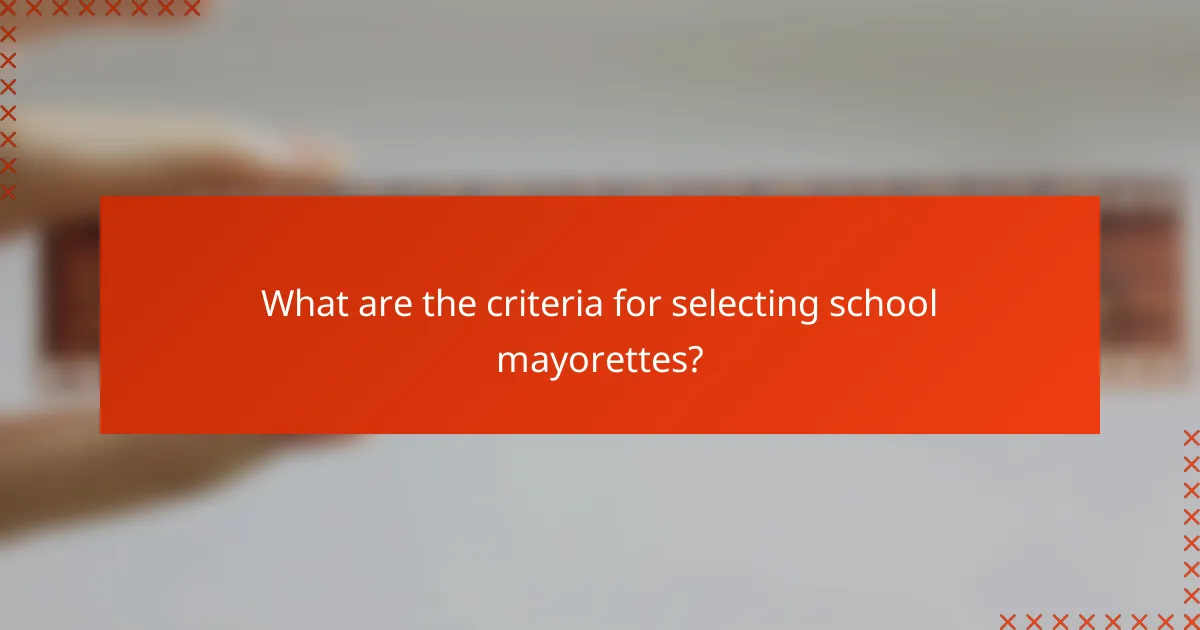
What are the criteria for selecting school mayorettes?
School mayorettes are typically selected based on a combination of leadership skills, commitment to school values, and active participation in school activities. These criteria ensure that mayorettes effectively represent their peers and contribute positively to the school community.
Demonstrated leadership potential
Demonstrated leadership potential is crucial for school mayorettes, as they often serve as role models for their classmates. Candidates should show initiative in group settings, take responsibility for projects, and inspire others to engage in school activities.
Examples of leadership potential include organizing events, leading clubs, or participating in student government. Schools may look for students who have previously held positions of responsibility or have been recognized for their leadership abilities by teachers or peers.
Commitment to school values
A strong commitment to school values is essential for mayorettes, as they embody the principles and culture of their educational institution. This includes demonstrating respect, integrity, and a willingness to support fellow students and staff.
To assess this commitment, schools may evaluate students’ participation in community service, adherence to school rules, and involvement in extracurricular activities that promote school spirit. Candidates should be able to articulate how they align with the school’s mission and values during the selection process.
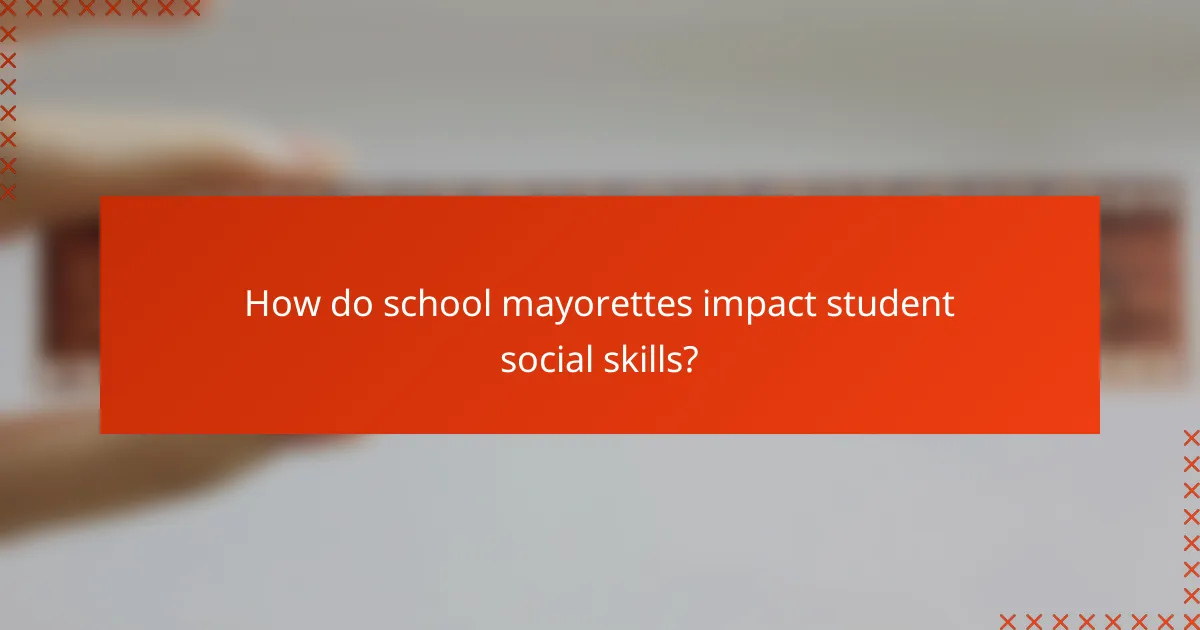
How do school mayorettes impact student social skills?
School mayorettes significantly enhance student social skills by fostering teamwork, communication, and leadership. Participation in this role encourages students to engage with peers and develop essential interpersonal abilities.
Improved communication abilities
Being a mayorette requires clear communication, both verbal and non-verbal. Students learn to convey messages effectively during events, which enhances their ability to articulate thoughts and ideas in various settings.
Practicing in front of an audience, whether during parades or school functions, helps students refine their public speaking skills. This experience can translate into better performance in classroom discussions and presentations.
Increased confidence in social settings
Mayorettes often take on leadership roles that naturally boost their confidence. By leading peers in activities and events, they gain a sense of responsibility and self-assurance that can positively affect their interactions.
As they navigate social situations, such as coordinating with classmates or addressing crowds, mayorettes become more comfortable in diverse environments. This increased confidence can lead to greater participation in other extracurricular activities and improved relationships with fellow students.
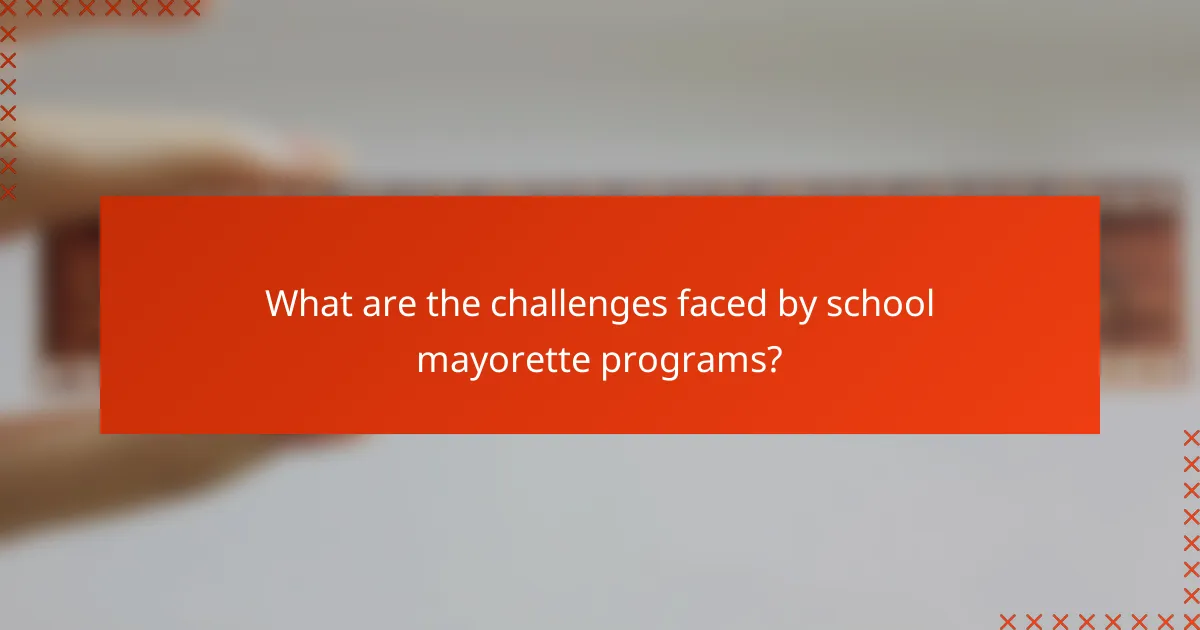
What are the challenges faced by school mayorette programs?
School mayorette programs encounter various challenges that can impact their effectiveness and participation. Key issues include balancing time commitments for students and ensuring inclusivity and diversity within the program.
Balancing time commitments
Students involved in mayorette programs often juggle multiple responsibilities, including academics, sports, and family obligations. This can lead to scheduling conflicts, making it difficult for them to fully engage in practices and events.
To address this, schools can implement flexible scheduling for practices and meetings, allowing students to participate without compromising their other commitments. Setting clear expectations about time requirements at the start of the program can also help students manage their schedules more effectively.
Ensuring inclusivity and diversity
Creating an inclusive and diverse mayorette program is essential for fostering a sense of belonging among all students. Programs that lack representation may discourage participation from underrepresented groups, limiting the overall effectiveness of the team.
To promote inclusivity, schools should actively recruit students from various backgrounds and ensure that the program’s activities reflect the diversity of the student body. Offering scholarships or financial assistance can also help remove barriers for those who may face economic challenges in joining.
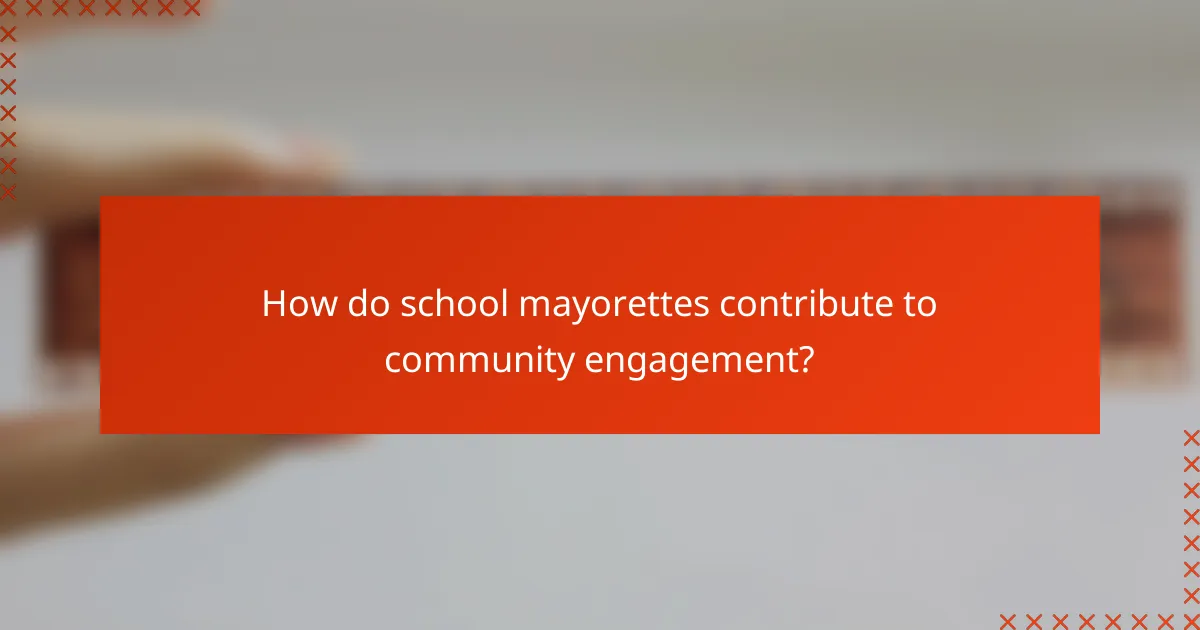
How do school mayorettes contribute to community engagement?
School mayorettes play a vital role in fostering community engagement by promoting school spirit and encouraging participation in local events. They serve as ambassadors for their schools, enhancing connections between students, families, and the wider community.
Educational benefits of school mayorettes
Being a mayorette provides numerous educational benefits, including the development of leadership skills and teamwork. Participants learn to collaborate effectively, manage responsibilities, and communicate with peers and adults, which are essential skills for future academic and career success.
Additionally, mayorettes often engage in public speaking and event organization, further enhancing their confidence and ability to present ideas clearly. These experiences can lead to improved academic performance, particularly in subjects like communication and social studies.
School pride and identity
School mayorettes significantly contribute to fostering school pride and a strong sense of identity among students. They often represent their school at various events, showcasing school colors and values, which helps to create a unified atmosphere.
This representation can inspire students to take pride in their school and encourage participation in other school activities, leading to a more vibrant school community. The visible presence of mayorettes at events can also strengthen relationships between students and faculty.
Extracurricular activities
Participation in mayorette programs is an excellent way for students to engage in extracurricular activities. These programs often include practices, performances, and community events, providing students with opportunities to socialize and develop new skills outside the classroom.
Moreover, being part of a mayorette team can enhance students’ time management skills as they balance their academic responsibilities with their extracurricular commitments. This involvement can also lead to lasting friendships and a stronger support network within the school community.
